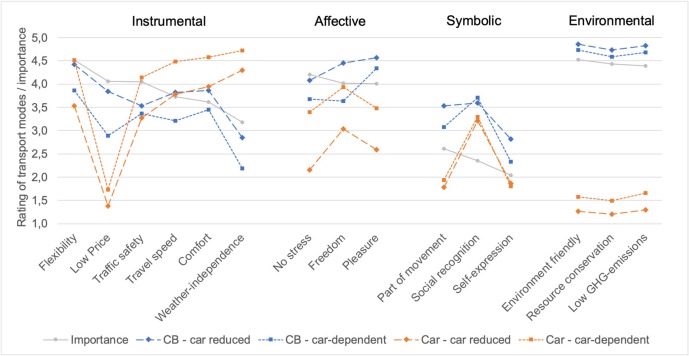The transport sector and especially private cars pose environmental, economic, and social challenges. For this reason, cargo bikes and shared mobility are considered viable alternatives for road transport. In order to understand the potential and barriers of alternative transport modes, it is essential to analyze underlying motives. Moreover, comparing sustainable alternatives (such as public transport) to cars in terms of motives has been established as a research approach (Steg, 2003). Despite increasing interest in cargo bikes and cargo bike sharing, research on this topic is relatively rare. Particularly, there exists a lack of research addressing the impact of cargo bike sharing on car ownership. Against this background, this study quantifies the car ownership reduction effect of cargo bike sharing. In addition, it is investigated how cargo bikes differ from cars with regard to the underlying motives of users which also helps understanding potential barriers. To answer these research questions, this study is based on a large-scale survey with n = 2,590 cargo bike sharing users. The results imply that cargo bike sharing has a notable impact on car ownership. In general, cargo bikes are rated superior in regard to affective, symbolic, and environmental motives as well as on flexibility and price. However, discrepancies to cars do exist in terms of other instrumental aspects (traffic safety, travel speed, comfort, weather-independence). Notably, users who reduced car ownership tend to rate cargo bikes superior compared to car-dependent users. The results imply that cargo bikes can play a marked role in reducing car dependency. Improving infrastructure and cargo bike technology as well as stimulating favorable social norms for cargo bikes have been identified as beneficial conditions that could help to leverage this potential.




Bikes are a very good solution for nearby travels (<10km), and cargo-bikes when you have kids.
We gave up the 2nd car for a cargo, it does not takes much more time than with car for trips less than 10km (work - daycare - school - groceries - park), it is easier to park anywhere without being an asshole (looking at you M. “just a minute stop on the sidewalk”), to flow through traffic during rush hours (with help of bike lanes), and it is good for your finances (no gas no insurance no parking, easy maintenance).
But we still need a car when we need to move 4 people for longer trips, and it is not for everyone, for instance my wife never ride it because she is afraid in traffic.
Other issue is the price perceived too high compared to a small used car : minimum 5k+ for an electric cargo (which you will want cause of elevation), or 3k+ for a longtail, or at least 2k for a homemade electric longtail (yuba+bafang) and you have to add the price of accessories if you hace kids (seats, rain canopy). If you want insurance it is 10% of the bike’s price so as much as a car insurance.
Most of people are not ready for the switch because the car is perceived as more convenient (safety, safe parking, can move 4-5 people + groceries at the same time, weather-proof) and don’t want to change habits, most of the time commuters are alone in their car with no groceries…
Shorten the trips and distances. The end of cars will come with big changes in how land is used.